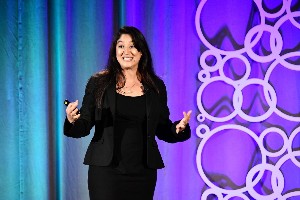
AACRAO’s 2018 Technology and Transfer Conference started with an appropriately engaging and fast-paced presentation by Stanford researcher Dr. Sheetal Patel. Recent research, she noted, has found that the average human attention span has dropped from 12 seconds to 8 seconds -- and some estimates are suggesting it’s as low as 3 seconds.
Kids in Generation Z, the ‘true digital natives,’ Patel suggests, are accustomed to using multiple devices at once, having experiences integrated across devices, and expect digital experiences to be customized to their needs and desires. (
See the AACRAO Connect article on Patel’s definition of Gen Z.)
As a result of their digital immersion, Gen Z are chronic multitaskers, often forgetful, and have a built-in immunity to marketing. Because they’re used to variety everywhere else, they expect variety in their classroom and work experience -- they don’t want to sit and do the same thing for an hour.
So how do colleges break through the information inundation?
From experience to transformation
“Face to face interactions matter,” Patel said. “But ‘face to face’ means something different to them. Snapchat, videoconferencing, Facetime -- these they see as authentic and personalized.”
Patel used Joseph Pine’s model of the “
experiential economy” to project what kind of consumers Gen Z will become. According to Pine, at each stage of the economy, producers had to add value to give consumers what they wanted. In agrarian cultures, just producing the commodities -- the coffee beans -- was enough. But competition forced commodity production to evolve into market goods -- ground coffee beans sold on the shelf. Again, competition forced the creation of the service industry -- brewed coffee for sale.
Most recently, the market has shifted from service to experience -- for example, the fact that Starbucks is the “third place” between work and home. They are selling more than just a brewed cup of joe; they’re selling the experience.
“Gen Z has grown up in the experiential economy, and they’ve grown to expect tailor-made experiences,” Patel said. “They’re used to customized experiences -- like Netflix -- based on what you’ve done in the past.”
Therefore, Pine concluded, the next stage of the economy will move from experience to transformational: a series of customized transactions that transform the consumer. The consumer expects to interact with the community producing the product and see how their interaction is transforming that community, as well.
How colleges can do transformation: Community and experiential learning
Fortunately, colleges are already in the business of transformative experience.
“Students choose their major, set their course schedule, go to clubs and extra curriculars -- all customized experiences, and after a few years they are changed and transformed into adults,” Patel said.
Higher education technology needs to adjust to make the transformation scalable.
“Community is a really important part of transformation,” Patel said. “Students automatically get customized experiences -- now they are ready for community facilitators: AI that can learn from a series of interactions and provide students a customized experience over time and help students built communities that give them security, emotional connections, expertise, and knowledge.”
In addition to agile, responsive communities, students will also seek experiential learning with reflective opportunities.
“We’re aiming to go from ubiquitous connectivity to ubiquitous community,” Patel said. “The end goal is transformative community, and technology is the means for that transformation, not the end.”
Change is messy
Patel asked the roomful of attentive attendees to cross their arms across their chest. Then she asked everyone to re-cross their arms in the opposite direction. After a lot of awkwardness, disorientation, and laughter, most of the room accomplished the non-intuitive task.
“Now the amount of discomfort, confusion, and extra time that took to just recross your arms? Take that times 10,000 -- and that’s what we’re asking when we’re asking for technological change on our campuses,” Patel said. “Change is not easy. It’s hard at first, messy in the middle, but it’s gorgeous in the end.”